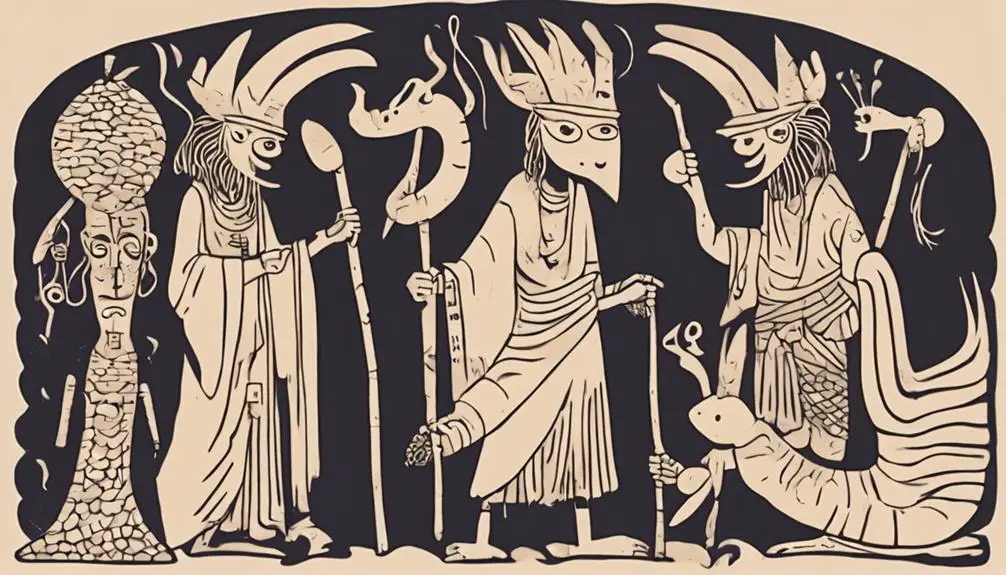Peek into puzzling passages and perplexing parables from the Bible, questioning their significance and seeking their hidden wisdom.

Dumbest Things in the Bible
The Bible, a treasure chest of wisdom and spiritual guidance, also harbors some tales that might seem, well, less than divine. You've probably heard of these perplexing narratives and peculiar commandments that make you raise an eyebrow or scratch your head.
But have you ever tried to unravel the meaning behind them or grasp their relevance in a modern world? Let's embark on this journey together, examining the more questionable elements of Biblical text, and see if we can't illuminate the shadows of confusion.
Who knows what we might discover in the process?
Key Takeaways
- The Bible contains bizarre rules such as the prohibition of mixed-material clothing and diverse seed planting.
- Unbelievable miracles like the parting of the Red Sea and a talking donkey challenge modern scientific understanding.
- Strange animal encounters in the Bible reflect an unusual relationship with the natural world.
- The Bible showcases peculiar punishments and complex prophecies that require careful historical and cultural interpretation.
Bizarre Rules and Commandments

Diving into an examination of the Bible, you'll stumble upon some truly bizarre rules and commandments that might leave you scratching your head. This Commandment Confusion, as we'll call it for the sake of this discussion, isn't just about the Ten Commandments we all know, but also about the lesser-known edicts found in the Old Testament.
Take, for instance, the Odd Ordinances found in Leviticus 19:19. This verse forbids wearing clothing woven of two types of material and planting a field with two kinds of seed. In our modern world, these commandments seem strange and impractical. Yet, they were probably central to ancient Israelite society's religious and cultural practices.
Another example is the commandment that forbids touching pig skin, found in Leviticus 11:8. This rule seems peculiar, especially considering the widespread use of pigskin in today's sporting events.
Analyzing these commandments with a modern lens can lead to bewilderment. However, it's crucial to remember the cultural and historical context in which they were written. This understanding can help ease the Commandment Confusion and provide insight into the Odd Ordinances of the Bible.
Absurd Biblical Miracles

Turning our attention now to the realm of the supernatural, you'll find a plethora of what may seem like absurd miracles recounted in the Bible. These tales of extraordinary events defy natural explanations, leading us into the world of Miracle Interpretations and Supernatural Phenomena.
Consider these three examples to illustrate the point:
- Moses Parting the Red Sea – Exodus recounts Moses parting the Red Sea, allowing the Israelites to escape Pharaoh's army. A wind that could split a sea certainly seems absurd from a modern scientific perspective.
- Joshua Halting the Sun – In the book of Joshua, the sun and moon are said to have stood still, providing daylight for Joshua to win a battle. The idea of celestial bodies halting in their tracks challenges our understanding of physics.
- Balaam's Talking Donkey – Numbers tells the tale of a donkey gaining the power of speech to warn Balaam of an angel's presence. An animal suddenly acquiring human speech is a miracle that surely stretches credulity.
In evaluating these miracles, it's essential to remember the cultural and historical context in which they were written. What may seem absurd to us may have been accepted as Supernatural Phenomena by ancient societies. The challenge lies in balancing our modern knowledge with respect for these ancient texts.
Unsettling Animal Encounters

Venturing further into the Bible's rich tapestry of narrative, you'll encounter a series of unsettling animal encounters that may challenge your perspective. Beginning with Levitical beast oddities, you'll find a list of animals deemed clean or unclean. The criteria seem arbitrary; for instance, the hare, despite being a herbivore, is deemed unclean due to misinformed ancient beliefs about its chewing habits.
Then there's Balaam's donkey, a mere beast of burden, who suddenly gains the ability to speak to rebuke its master. It's an odd yet thought-provoking encounter, raising questions about divine intervention and communication between species.
No discussion of biblical animal encounters would be complete without mentioning Noah's Ark. The paradoxes here are manifold. How could all the world's species possibly fit on one vessel, and how were they gathered from all corners of the earth? Not to mention the logistical nightmare of feeding and housing such a diverse menagerie.
These examples highlight the Bible's complex relationship with the natural world. They engage with our understanding of animals in ways that are at times disturbing, paradoxical, and deeply symbolic. While they may seem strange to modern readers, they serve as a reflection of the cultural and religious context of the era.
Strange Punishments and Curses

Just as you grapple with the biblical animal encounters, you're also confronted with a series of strange punishments and curses that further complicate the text's interpretation. The Bible, rich in dramatic narratives, contains several instances of 'Unusual Divine Retributions and Odd Biblical Consequences' that may leave you puzzled.
For instance, consider the following:
- The curse of Cain in Genesis 4:12 – After murdering his brother Abel, Cain is condemned to be a restless wanderer on the earth. An eternal vagabond, unable to find rest or stability.
- The punishment of King Nebuchadnezzar in Daniel 4:28-33 – The King, in his pride, is transformed into a beast of the field for seven years. An extreme example of divine retribution against arrogance and hubris.
- The bizarre curse of Elisha in 2 Kings 2:23-24 – When mocked by youths, Elisha curses them, resulting in two she-bears mauling 42 of them. An odd consequence indeed.
These examples highlight the Bible's intricate web of morality and justice, where actions often carry peculiar and unexpected consequences. It's a testament to the text's complexity and its ability to consistently provoke thought and challenge interpretation.
Puzzling Prophecies and Visions

Beyond the realm of divine retributions and consequences, you'll encounter an array of puzzling prophecies and visions that further enrich the Bible's enigmatic narrative. These instances, often marked by prophetic inconsistencies and complex vision interpretations, add layers of complexity to the text.
Consider, for instance, the prophecy of Tyre in Ezekiel. The prophecy states Tyre would be destroyed and never rebuilt, but it thrives today. We also have the vision of the beasts in Daniel, shrouded in intricate symbolism that has sparked countless theories.
Below is a table offering an overview of some of these puzzling passages:
Passage |
Prophecy/Vision |
Common Interpretations |
|---|---|---|
Ezekiel 26:1-14 |
Destruction of Tyre |
Historical event, metaphorical destruction |
Daniel 7 |
Four beasts |
Different empires, end-times events |
Revelation 17 |
Woman on the beast |
False religious system, Babylon |
These examples illustrate the Bible's rich tapestry of prophetic literature. It's not about labelling these as 'dumb', but rather acknowledging the inherent complexities and inconsistencies that make interpretation challenging. Remember, you're reading an ancient text filled with cultural, historical, and linguistic nuances. Hence, when you encounter a puzzling prophecy or vision, consider it an invitation to dig deeper, to question, and to explore.
Frequently Asked Questions
How Does the Bible Influence Modern Legal Systems?
You mightn't realize it, but the Bible has significantly influenced modern legal systems.
While there are biblical contradictions, many legal precedents are rooted in biblical principles.
Concepts like justice, fairness, and morality, found in the Bible, are also fundamental to legal frameworks.
Yet, it's essential to remember that legal systems have evolved over time, interpreting and adapting these principles to suit the needs of contemporary societies.
What Are Some of the Most Inspirational Passages in the Bible?
You're seeking divine motivation and biblical wisdom, aren't you? Consider Psalm 46:1-3, 'God is our refuge and strength, an ever-present help in trouble'. It's an uplifting passage showing unwavering trust in God's protection.
Or, delve into Proverbs 3:5-6, 'Trust in the LORD with all your heart and lean not on your own understanding'. It's a timeless reminder to rely on divine wisdom, not just our own.
These verses can inspire you deeply.
Can the Bible Be Interpreted in Different Ways, and if So, How?
Yes, you can interpret the Bible in various ways. It's rich with religious symbolism and biblical parables, which are open to interpretation.
You'll often find that parables hold deeper meanings, beyond their literal text. The symbolism used is a means to express complex spiritual concepts.
It's key to approach these texts with an open mind, allowing your understanding to deepen over time. Your interpretation may differ from others, reflecting your unique spiritual journey.
Are There Any Scientific Theories That Align With Stories in the Bible?
Yes, there are scientific theories that find parallels in biblical stories. For instance, the Big Bang theory can be seen as aligning with the Genesis creation account.
Also, biblical cosmology's depiction of the universe has been related to modern cosmological theories.
However, these parallels often spark the creationism debate, questioning whether science and religion can coexist.
It's important to remember that interpretation plays a critical role in these discussions.
How Has the Bible Influenced Major Historical Events?
The Bible, through its biblical prophecies, has significantly shaped major historical events. For instance, it has been used to justify religious wars, influencing political strategies and societal norms. You'll find its impact in the Crusades, the Reformation, and even the American Civil Rights movement.
Its teachings have affected kings, presidents, and common people alike, altering the course of history. So, the Bible's influence on historical events is profound and far-reaching.
Conclusion
So, you've journeyed through some of the Bible's more perplexing aspects, from odd commandments to baffling miracles, curious animal encounters to puzzling prophecies.
While these may seem absurd to our modern sensibilities, they underscore the richness and complexity of this ancient text.
As you continue your exploration, remember to approach these narratives with an open mind, understanding that they reflect the cultural and historical context of their time.



Sign up